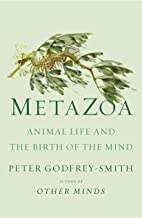Metazoa: Animal Life and the Birth of the Mind by Peter Godfrey-Smith 2020
This is quite a wondrous book. Not for those with short attention spans or a limited interest in science, but for the rest of us, this is a fascinating and mind-expanding trip through the last several billion years on earth as the single celled organism moves ever more towards complexity and consciousness.
Godfrey-Smith is an Australian philosopher and brings a philosopher’s approach to the issue of how does a mass of living tissue, the brain, do things like think, remember, and animate the body’s actions. This is a very different approach than Nurse and Zimmer applied in their recent books about ‘what is life’. Godfrey-Smith is not terribly interested in what defines life, but is deeply and passionately interested in what defines consciousness and who/what has it.
Moving through evolution from the single celled protozoa to the animal kingdom, he explores the dualities of materialism/vitalism, sensing/acting, subject/agency, complexity/unity as he struggles to figure out how we understand ‘felt experience’ and develop a ‘point of view’ as a self. He rejects the dualism of mind/body as well as the standard materialist viewpoint of the brain and the self being simply a summation of the ons/offs of chemical reactions. Rather, he focuses on the taming of electrical activity (ion-channels) as the main leap for animals in evolution that resulted in ‘large scale dynamics’ beyond the basic switching functions of materialism. It’s the large scale dynamics creating electrical patterning, oscillations, and fields beyond the brain’s simple chemical reactions that are the key for Godfrey-Smith, and their presence in the octopus, fish, and mammals may mean that consciousness, or at least an awareness of a self in an environment, may be much more widespread than we have thought in the past.
There is much more to this book than I can relate, so if this sounds interesting to you, read it by all means. If you’re own mind has drifted off into unconsciousness while reading this review, skip the book and move on to Thomas Perry’s assassin for a good time.



